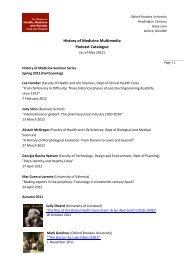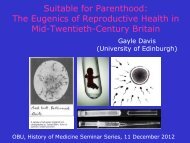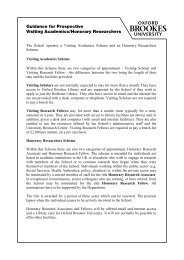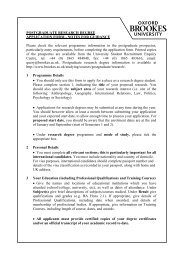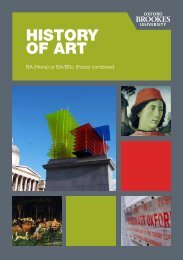communication, media and culture - Oxford Brookes University ...
communication, media and culture - Oxford Brookes University ...
communication, media and culture - Oxford Brookes University ...
You also want an ePaper? Increase the reach of your titles
YUMPU automatically turns print PDFs into web optimized ePapers that Google loves.
COMMUNICATION,<br />
MEDIA AND CULTURE<br />
BA (Hons) or BA/BSc (Hons) combined
Johnny Pawlik studied Communication, Media <strong>and</strong> Culture as he wanted to pursue a<br />
career in advertising <strong>and</strong> marketing.<br />
The CMC course offers many modules that are both interesting <strong>and</strong> give practical knowledge<br />
which is extremely useful in a variety of work environments. Assignments are all coursework-based<br />
which was really good for me as I feel that my true potential cannot be shown in exams.<br />
The course lecturers are all really passionate about their subjects which really motivated me as<br />
a student. All staff are friendly <strong>and</strong> approachable. This is particularly important especially if you<br />
are ever struggling with assignments. Numerous students also get together after seminars to<br />
discuss topics <strong>and</strong> help one another out.<br />
<strong>Oxford</strong> <strong>Brookes</strong> is a culturally rich university <strong>and</strong> there are loads of societies that have enabled<br />
me to make close friends with people from all over the world.<br />
For more student profiles visit www.history.brookes.ac.uk
WHY<br />
STUDY<br />
COMMUNICATION,<br />
MEDIA AND<br />
CULTURE?<br />
Communication, Media <strong>and</strong> Culture is an exciting,<br />
contemporary subject that will provide you with the skills that<br />
are vital in today’s competitive world. At <strong>Oxford</strong> <strong>Brookes</strong> you<br />
can choose the field that interests you most, leading to an<br />
underst<strong>and</strong>ing of how <strong>communication</strong> works at all levels.<br />
Contents<br />
2 Why choose <strong>Oxford</strong> <strong>Brookes</strong>? 4 Teaching <strong>and</strong> learning<br />
5 Research <strong>and</strong> expertise 6 Course Structure 7 Career choices<br />
8 Modules 13 Key Facts<br />
1
WHY<br />
CHOOSE<br />
OXFORD<br />
BROOKES?<br />
Distinctive features<br />
n<br />
n<br />
n<br />
n<br />
Choice of single or combined honours<br />
Internationally recognised course tutors<br />
First rate facilities<br />
<strong>Oxford</strong> is a <strong>media</strong> <strong>and</strong> <strong>communication</strong>s<br />
hotspot<br />
Established reputation<br />
Our course tutors have a range of interests <strong>and</strong><br />
expertise <strong>and</strong> many are internationally recognised<br />
for their work.<br />
Student choice<br />
We use a variety of assessment methods<br />
alongside more traditional formats such as<br />
essays <strong>and</strong> presentations. Our aim is to ensure<br />
that you develop your particular strengths <strong>and</strong><br />
interests, as well as helping you to develop<br />
<strong>communication</strong> <strong>and</strong> research skills for the world<br />
beyond the university.<br />
Study abroad<br />
We encourage students to study abroad as part of<br />
their degree programme. You can study for one or<br />
two semesters at an approved institution in Europe,<br />
the USA, Canada or Australia. The study credits<br />
you earn abroad will be transferred to your <strong>Brookes</strong><br />
degree programme.<br />
2<br />
,,<br />
The best part about studying at <strong>Oxford</strong> <strong>Brookes</strong> is its location. <strong>Oxford</strong> is a beautiful, vibrant<br />
city visited by people all over the world for its <strong>culture</strong>, architecture <strong>and</strong> history. One in five of<br />
<strong>Oxford</strong>’s population is a student, making the city even more welcoming to students. There<br />
are plenty of friendly faces on campus creating a real sense of community.<br />
Remi Edun, graduate
Support<br />
Throughout your time at <strong>Brookes</strong> you will receive<br />
excellent support from our dedicated staff, both<br />
academically <strong>and</strong> personally. From academic<br />
advisers <strong>and</strong> student support co-ordinators, to<br />
specialist subject librarians <strong>and</strong> other learning<br />
support staff, we will support you to ensure that<br />
you get the best out of your studies.<br />
Our student support co-ordinators are there<br />
to support you in all aspects of your academic<br />
career, from module choices to any personal<br />
issues you may experience. We want your time<br />
at <strong>Brookes</strong> to be as enjoyable <strong>and</strong> successful as<br />
possible. That’s why we provide all the facilities<br />
you need to be relaxed, happy <strong>and</strong> healthy<br />
throughout your studies.<br />
Through our Upgrade service we offer advice<br />
on all aspects of study, from planning <strong>and</strong><br />
writing essays to statistical analysis, either in a<br />
one-to-one situation or as a drop-in session.<br />
Upgrade is a free service available to all<br />
students at any level, <strong>and</strong> is unique to <strong>Oxford</strong><br />
<strong>Brookes</strong>.<br />
www.brookes.ac.uk/services/upgrade<br />
Resources<br />
With over half a million books, DVDs <strong>and</strong><br />
CDs, a vast range of databases, e-journals<br />
<strong>and</strong> reference materials, the library provides<br />
all the resources you need for your study<br />
of Communication, Media <strong>and</strong> Culture. Our<br />
dedicated CMC librarian will help you access<br />
relevant materials <strong>and</strong> guide you through the<br />
huge range of information available to you.<br />
Online Resources<br />
Core materials relating to learning <strong>and</strong><br />
assessment are available online through<br />
our virtual learning portals. These include<br />
lecture schedules, module guides, supporting<br />
materials, guidelines <strong>and</strong> criteria for coursework<br />
along with notes on essay writing <strong>and</strong> report<br />
presentation.<br />
3
TEACHING<br />
AND<br />
LEARNING<br />
One of the key features of the Communication, Media <strong>and</strong> Culture<br />
course is the active participation of students in the process of learning.<br />
Teaching<br />
Our teaching involves a mixture of lectures,<br />
seminars, tutorials <strong>and</strong> online methods, <strong>and</strong><br />
emphasises the role of students in initiating<br />
enquiry, gathering information, <strong>and</strong> analysing<br />
<strong>and</strong> presenting their findings.<br />
Throughout the course you will be taught by<br />
specialist lecturers with a wide range of interests<br />
who research <strong>and</strong> publish in many of the areas<br />
you will be investigating. This ensures that<br />
you are introduced to the latest debates <strong>and</strong><br />
developments within the field.<br />
Assessment<br />
We use a range of forms of assessment, but<br />
you are graded wholly on coursework. Wherever<br />
possible your assignments are designed to<br />
relate to real-life situations <strong>and</strong> reflect your own<br />
interests.<br />
As well as written work, some modules provide<br />
the opportunity for group work <strong>and</strong> practicebased<br />
assessment in order to assist you in<br />
developing the key skills you will need for the<br />
world of work.<br />
4<br />
,,<br />
I definitely feel that I have improved my interpersonal skills <strong>and</strong> ability to work as part of a<br />
team. I hope to find employment in creative advertising after I complete my degree.<br />
Ewa K. Semenowicz, undergraduate
RESEARCH<br />
AND<br />
EXPERTISE<br />
Our course tutors have a range of interests <strong>and</strong> expertise <strong>and</strong> many are<br />
internationally recognised for their work.<br />
Research <strong>and</strong> expertise<br />
Communication, Media <strong>and</strong> Culture is recognised<br />
for its excellent teaching <strong>and</strong> international research<br />
reputation, allowing students to learn from the very<br />
latest academic thinking.<br />
Our lecturers are regularly asked by the <strong>media</strong> to<br />
comment on issues currently in the news, such<br />
as the right to privacy versus public interest, <strong>and</strong><br />
the relationship between creative industries, public<br />
funding <strong>and</strong> commercial interests. They publish<br />
widely, <strong>and</strong> are frequently invited to present their<br />
work at national <strong>and</strong> international conferences.<br />
Will I get involved?<br />
We value research highly <strong>and</strong> actively<br />
encourage you to become a researcher in<br />
your own right. By designing <strong>and</strong> undertaking<br />
your own research you will develop excellent<br />
analytical <strong>and</strong> independent study skills, adding<br />
weight to your CV.<br />
,,<br />
There’s so much to learn... there are a variety of different lecturers with different specialisms<br />
who are really enthusiastic <strong>and</strong> helpful<br />
Fiona Doran, graduate<br />
5
COURSE<br />
STRUCTURE<br />
Communication, Media <strong>and</strong> Culture at <strong>Oxford</strong> <strong>Brookes</strong> offers a huge range<br />
of modules, allowing you to select <strong>and</strong> explore those aspects of the field<br />
that most interest you.<br />
The modules that make up the programme are<br />
organised around four key themes:<br />
Interpersonal <strong>and</strong> Institutional:<br />
These are modules that address interpersonal<br />
<strong>and</strong> psychological aspects of <strong>communication</strong><br />
<strong>and</strong> identity formation, as well as questions<br />
of corporate, organisational <strong>and</strong> institutional<br />
<strong>communication</strong> such as management, business,<br />
marketing, br<strong>and</strong>ing <strong>and</strong> corporate identity.<br />
Production <strong>and</strong> Practical:<br />
These are applied modules in which participants<br />
learn how to use a form of <strong>communication</strong><br />
technology to create a product, including video<br />
production, web design <strong>and</strong> computer-aided<br />
design, or cultivate a practical skill such as<br />
linguistic analysis, research methodologies, or<br />
foreign language teaching.<br />
Cultural <strong>and</strong> Critical:<br />
These are modules that reflect on the changing<br />
nature of contemporary <strong>culture</strong>, <strong>and</strong> the identities<br />
<strong>and</strong> values of those who live within it. They focus<br />
on the impact of online <strong>communication</strong>, digital<br />
technologies <strong>and</strong> social networking, <strong>and</strong> the<br />
influence of the rapidly-evolving modern <strong>media</strong> on<br />
all our lives.<br />
Language <strong>and</strong> Linguistics:<br />
These are modules that investigate some aspect<br />
of language, linguistics <strong>and</strong> discourse, such as the<br />
importance of English as a global language, how<br />
we manage conversations <strong>and</strong> interpret meaning,<br />
how language develops in children, <strong>and</strong> the power<br />
of language to persuade <strong>and</strong> shape our thinking.<br />
During your time studying on the course, you<br />
can choose to specialise in one or more of these<br />
themes, or you can select a range of modules<br />
from across all four themes, depending on your<br />
interests.<br />
6
CAREER<br />
CHOICES<br />
Ask any employer what skills they look for <strong>and</strong> you can be certain that<br />
the ability to communicate will be high up on the list.<br />
Research indicates that <strong>communication</strong><br />
skills are among those most highly valued by<br />
employers in all sectors of the economy. In an<br />
increasingly <strong>media</strong> saturated world, employers<br />
need graduates with a critical underst<strong>and</strong>ing of<br />
how the <strong>media</strong> <strong>and</strong> <strong>communication</strong>s work at<br />
individual <strong>and</strong> organisational levels.<br />
Like other humanities degrees, Communication,<br />
Media <strong>and</strong> Culture offers valuable skills such<br />
as analytical thinking, research skills, selfdiscipline<br />
<strong>and</strong> effective written <strong>and</strong> spoken<br />
<strong>communication</strong><br />
Our graduates enter a very wide range of<br />
careers, from marketing, advertising <strong>and</strong><br />
journalism to the civil service. Other relevant<br />
employment sectors include <strong>media</strong>-based<br />
industries, public relations, education, charity<br />
fundraising, hospitality, film production,<br />
publishing, web marketing <strong>and</strong> international<br />
organisations such as the British Council.<br />
Our Careers <strong>and</strong> Employment Centre is on<br />
h<strong>and</strong> throughout your time at <strong>Oxford</strong> <strong>Brookes</strong>,<br />
guiding your development from undergraduate<br />
to professional. An invaluable resource to all<br />
students, the Centre provides a wealth of<br />
information throughout your studies, from career<br />
guidance <strong>and</strong> advice, to application procedures<br />
<strong>and</strong> practical interview skills.<br />
www.brookescareerscentre.co.uk<br />
7
MODULES<br />
All our modules are reviewed regularly to ensure that they respond to<br />
developments in the subject area <strong>and</strong> the needs of employers. The list<br />
below is indicative of the range of modules that are currently available.<br />
8<br />
YEAR ONE<br />
Underst<strong>and</strong>ing Communication<br />
This module introduces you to the key<br />
concepts <strong>and</strong> theories in the study of<br />
<strong>communication</strong>. We will look at cultural<br />
differences in <strong>communication</strong>, <strong>and</strong> how models<br />
of <strong>communication</strong> can be applied to the real<br />
world. You will be given the opportunity to<br />
investigate how we learn to communicate <strong>and</strong><br />
how behaviour contributes to the effectiveness<br />
of human interaction.<br />
Underst<strong>and</strong>ing Media<br />
Introduces the key concepts, theories <strong>and</strong><br />
themes within the study of the <strong>media</strong>. You will<br />
investigate <strong>and</strong> critically reflect on different<br />
aspects of mass <strong>communication</strong> <strong>and</strong> explore<br />
the impact of contemporary <strong>media</strong> technologies<br />
on individuals <strong>and</strong> society.<br />
Academic Literacies: Communication<br />
The aim of the module is to equip you with the<br />
essential tools, skills <strong>and</strong> concepts needed for<br />
the effective study of Communication, Media<br />
<strong>and</strong> Culture in a university context.<br />
Underst<strong>and</strong>ing Culture<br />
You will study different aspects of popular<br />
<strong>culture</strong>, the impact of global <strong>and</strong> digital <strong>culture</strong>,<br />
the importance of race, gender <strong>and</strong> sexuality<br />
within contemporary <strong>culture</strong>, <strong>and</strong> the ways in<br />
which all these affect you.<br />
Underst<strong>and</strong>ing Language<br />
This module introduces you to key concepts in<br />
the study of language <strong>and</strong> its use in contexts of<br />
<strong>communication</strong>. It develops an underst<strong>and</strong>ing<br />
of language description <strong>and</strong> associated<br />
terminology <strong>and</strong> introduces students to wellestablished<br />
frameworks for linguistic analysis<br />
such as functional grammar, discourse analysis<br />
<strong>and</strong> pragmatics. Students will learn how to<br />
apply these concepts <strong>and</strong> analytical frameworks<br />
to the analysis of written <strong>and</strong> spoken language.<br />
You will develop insights into the nature <strong>and</strong> the<br />
process of language use in <strong>communication</strong>.
YEARS 2 AND 3<br />
Communication, Culture <strong>and</strong> Organisations<br />
The module focuses on the importance of<br />
<strong>communication</strong> within organisations from<br />
both an individual <strong>and</strong> corporate perspective.<br />
Corporate identity <strong>and</strong> <strong>culture</strong> will be examined<br />
to help you underst<strong>and</strong> the complexity of the<br />
modern workplace. How do companies br<strong>and</strong><br />
themselves <strong>and</strong> their employees? Do we<br />
lose a sense of identity within corporations or<br />
find ourselves, through a sense of belonging<br />
to an organisation with a strong <strong>culture</strong>?<br />
The module will emphasise the positive<br />
ways to encourage better <strong>communication</strong><br />
through an underst<strong>and</strong>ing of issues that<br />
cause misunderst<strong>and</strong>ings <strong>and</strong> conflict <strong>and</strong><br />
suggest ways to facilitate better organisational<br />
<strong>communication</strong>.<br />
Video Planning <strong>and</strong> Production<br />
You will learn how to communicate effectively<br />
through the medium of video through theoretical<br />
<strong>and</strong> practical study. You will be introduced to<br />
the various skills involved in producing a video,<br />
such as script writing, budgeting, schedule<br />
planning <strong>and</strong> time management.<br />
Critical Media Literacies<br />
Develops your underst<strong>and</strong>ing of a range of<br />
critical approaches to <strong>media</strong> analysis. You will<br />
be introduced to significant <strong>media</strong> theorists <strong>and</strong><br />
will consider the application <strong>and</strong> importance of<br />
their ideas for constructing meaning in <strong>media</strong><br />
texts from individual, cultural <strong>and</strong> institutional<br />
perspectives.<br />
Design for Online Communication<br />
Designing a successful website requires<br />
specialist skills <strong>and</strong> knowledge. At its best,<br />
effective online <strong>communication</strong> combines<br />
theory, technical knowledge <strong>and</strong> creativity. This<br />
module considers issues of design, layout,<br />
usability <strong>and</strong> accessibility in the construction<br />
of contemporary websites, <strong>and</strong> examines<br />
what it takes to produce a site that is both<br />
aesthetically pleasing <strong>and</strong> easily navigable. You<br />
will be introduced to the fundamental practical<br />
elements of web design, including HTML <strong>and</strong><br />
CSS, <strong>and</strong> create a website of your own design<br />
using established software applications. No<br />
prior experience of web design is required.<br />
Intercultural Communication<br />
Introduces you to an underst<strong>and</strong>ing of<br />
intercultural 'self' <strong>and</strong> 'other'. The module<br />
examines the processes involved in intercultural<br />
contact <strong>and</strong> the role of cultural identity. You will<br />
be shown how to examine your own cultural<br />
identity from a critical 'outsider' perspective,<br />
<strong>and</strong> how to use this underst<strong>and</strong>ing of your<br />
own cultural bias in the co-construction of<br />
intercultural exchanges <strong>and</strong> relationships in a<br />
culturally diverse world.<br />
Persuasive Communication<br />
Asks the question ‘what are the strategies<br />
<strong>and</strong> techniques that allow us to communicate<br />
our knowledge of the world, <strong>and</strong> of ourselves,<br />
to a variety of public <strong>and</strong> professional global<br />
audiences?’ The module answers the question<br />
by exploring the creative processes <strong>and</strong><br />
techniques of persuasive messaging. We will<br />
explore what makes messaging effective,<br />
attractive <strong>and</strong> ethical as well as looking at the<br />
influences of audience <strong>and</strong> genre.<br />
Methodology of Foreign Language Teaching<br />
An introduction to the theory <strong>and</strong> practical<br />
application of the principles of second or foreign<br />
language teaching at secondary or adult levels.<br />
You will develop an awareness of a range of<br />
teaching techniques <strong>and</strong> apply these to the<br />
language classroom. The module leads to<br />
familiarity with aspects of grammar, vocabulary,<br />
pronunciation <strong>and</strong> classroom management,<br />
all part of the language teacher's repertoire.<br />
The module also raises students' awareness<br />
of issues in reading, writing <strong>and</strong> speaking<br />
when teaching these skills in the classroom.<br />
The module includes an important element of<br />
microteaching in small groups.<br />
New Media <strong>and</strong> Youth Identities<br />
Considers how technologies <strong>and</strong> trends<br />
such as mobile phones, gaming <strong>and</strong> social<br />
networking sites offer new ways of expressing<br />
<strong>and</strong> communicating selfhood, <strong>and</strong> how they<br />
shift perceptions of private <strong>and</strong> public identity.<br />
The convergence of new technologies <strong>and</strong><br />
of users/producers, <strong>and</strong> the commoditisation<br />
of virtual identities will be considered, <strong>and</strong><br />
we will reflect on issues of engagement <strong>and</strong><br />
exclusion in terms of gender, age, class <strong>and</strong><br />
geopolitics, <strong>and</strong> also on adult perceptions <strong>and</strong><br />
representations of digital worlds. 9
10<br />
Writing Technologies<br />
You will examine the impact of the technology<br />
of writing on individuals <strong>and</strong> society. Starting<br />
with Socrates' infamous discussion of the<br />
origins <strong>and</strong> doubtful value of writing, the module<br />
goes on to examine Marshall McLuhan's<br />
complementary analyses of preliterate societies<br />
<strong>and</strong> the profound cultural changes that are<br />
brought about by writing <strong>and</strong> print. Over the<br />
course we will consider the philosophical,<br />
historical, cultural <strong>and</strong> political importance of<br />
different writing technologies <strong>and</strong> modes of<br />
written <strong>communication</strong>, such as h<strong>and</strong>writing,<br />
print, type, text <strong>and</strong> hypertext.<br />
Group Dynamics<br />
Much of the world's work is undertaken by<br />
groups, <strong>and</strong> face-to-face interaction in small<br />
groups is an important feature of most people's<br />
everyday lives. Whether the group is a family, a<br />
sports team, a work group, a network of friends<br />
or a group of students working on a university<br />
assignment, group membership has a profound<br />
impact on us as individuals, shaping our<br />
feelings, judgements <strong>and</strong> actions. This module<br />
draws on research in the emerging field of<br />
group dynamics <strong>and</strong> will be of interest to those<br />
wanting to underst<strong>and</strong> how groups function.<br />
Publishing in the Digital Age<br />
An examination of how digital technology is<br />
revolutionising the publishing industry. The<br />
module studies the impact of new technology<br />
on the printed word, from the arrival of desktop<br />
publishing systems to the interactive book,<br />
focusing on current developments. Business<br />
models are investigated alongside current digital<br />
publishing strategies <strong>and</strong> practices.<br />
Publishing Media Workflow<br />
You will explore the operational roles of the<br />
editorial <strong>and</strong> production departments within<br />
the publishing process, <strong>and</strong> the skills <strong>and</strong><br />
knowledge for the management of a publishing<br />
project. Basing its approach on market<br />
considerations, the module focuses on the<br />
principles of visual <strong>and</strong> graphic <strong>communication</strong>,<br />
<strong>and</strong> production <strong>and</strong> delivery in a digital<br />
environment. Particular attention is paid to the<br />
effects of digital technology on the ways in<br />
which products are developed <strong>and</strong> produced,<br />
<strong>and</strong> opportunities afforded to publishers to<br />
produce for different delivery environments<br />
Cultures of Publishing<br />
Through a combination of lectures <strong>and</strong><br />
seminars the module examines the <strong>culture</strong> <strong>and</strong><br />
ideology of post-1945 publishing. We consider<br />
the development of publishing in this period,<br />
its contemporary practice <strong>and</strong> likely future<br />
developments. It also focuses on the publishing<br />
of contemporary fiction, exploring phenomena<br />
such as literary prizes, the interaction of<br />
the <strong>media</strong> with the publishing industry, <strong>and</strong><br />
through readings of bestselling texts of the<br />
period, asking how notions of literary value are<br />
constructed.<br />
Forensic Linguistics<br />
Refers to the analytical study of texts which<br />
have crime <strong>and</strong> criminality as a central issue.<br />
We examine the concepts <strong>and</strong> methodologies<br />
in forensic linguistic analysis, looking at the<br />
ways linguistic analysis is applied to evidence<br />
<strong>and</strong> documentation in criminal cases. Forensic<br />
linguistics has been employed by government<br />
intelligence agencies around the world in<br />
national security <strong>and</strong> plays an important role<br />
in political discourse. We will examine how<br />
forensic linguistics has been employed in<br />
these contexts by considering some relevant<br />
examples of forensic linguistic investigation.<br />
Analysing English Language<br />
Looks at the theoretical <strong>and</strong> analytical<br />
framework for the analysis of spoken <strong>and</strong><br />
written texts. You will be introduced to<br />
systemic-functional linguistics models used in<br />
the analysis of texts, exploring the relationship<br />
between context <strong>and</strong> language in a range of<br />
contexts.<br />
Language, Culture & Globalisation<br />
This module examines the ways in which<br />
language operates in local <strong>and</strong> global contexts<br />
as a means of socio-cultural representation. It<br />
will explore sociolinguistics <strong>and</strong> the globalisation<br />
of English as an international language. Topics<br />
include the role of language in politics, gender,<br />
<strong>and</strong> globalisation, the st<strong>and</strong>ardisation of<br />
language <strong>and</strong> linguistic imperialism.<br />
Children <strong>and</strong> the Media<br />
You will explore the way in which children<br />
interact with different forms of <strong>media</strong> <strong>and</strong><br />
consider this from a variety of perspectives<br />
including developmental, sociological <strong>and</strong>
educational. The module will consider the<br />
ways in which children react to <strong>and</strong> learn from<br />
different forms of <strong>media</strong>, for example television,<br />
video games, computer, mobile <strong>and</strong> imagining<br />
technologies.<br />
Learning Through Social Interaction<br />
The module will examine a variety of learning<br />
interactions in formal <strong>and</strong> informal settings. It<br />
will explore the relationship between language,<br />
underst<strong>and</strong>ing <strong>and</strong> learning contexts. The<br />
content will draw from the fields of social<br />
psychology, education, language studies <strong>and</strong><br />
<strong>communication</strong>. You will have the opportunity<br />
to extend your underst<strong>and</strong>ing of the social<br />
dynamics of learning by engaging with relevant<br />
academic research <strong>and</strong> analysing it in the light<br />
of your own experience.<br />
Philosophy of Language<br />
An introduction to one of the dominant<br />
contemporary traditions in philosophy. The<br />
Anglo-American analytic tradition places<br />
great emphasis upon underst<strong>and</strong>ing how<br />
language works. The aim of this module is to<br />
provide students with a grounding in the basic<br />
approaches to meaning <strong>and</strong> reference found in<br />
the work of Frege, Ayer, Wittgenstein, Austin,<br />
Grice, Quine, Putnam, Evans, Dummet, Searle,<br />
Strawson, <strong>and</strong> so-called 'ordinary language'<br />
philosophers. The use of these theories in other<br />
areas of philosophy will also be explored.<br />
Culture, Gender <strong>and</strong> Sexuality<br />
An exploration of the relationship between<br />
issues of gender, sexuality <strong>and</strong> <strong>culture</strong> as key<br />
factors in human identity, development <strong>and</strong><br />
society. The module critiques traditional <strong>and</strong><br />
static underst<strong>and</strong>ings of gender <strong>and</strong> sexuality,<br />
drawing on the insights of a diversity of<br />
disciplines including those of gender studies,<br />
critical theory, queer theory, feminist theology<br />
<strong>and</strong> feminist criticism.<br />
Psychology of Communication<br />
Provides you with an opportunity to examine<br />
in depth the <strong>communication</strong> process from a<br />
psychological perspective. We will explore<br />
the process of communicating meaning from<br />
a psycholinguistic <strong>and</strong> a social cognitive<br />
perspective. We will look at how individuals<br />
make sense of their own <strong>communication</strong>s<br />
<strong>and</strong> those of other people in a social setting.<br />
Examples of interpersonal <strong>communication</strong> will<br />
be looked at, in particular the use of social<br />
<strong>media</strong> <strong>and</strong> the internet.<br />
Cities <strong>and</strong> Society<br />
The module examines multiple perspectives on<br />
the city as a global phenomenon. It examines<br />
the rise <strong>and</strong>, for some, decline of cities. Cities<br />
are seen as centres where creative movements<br />
<strong>and</strong> changes have occurred throughout their<br />
history. They have been a meeting point for<br />
diverse groups who use urban space differently<br />
<strong>and</strong> have unequal access to living space <strong>and</strong><br />
economic opportunities. We examine these<br />
processes <strong>and</strong> how they impact upon the<br />
<strong>culture</strong>, people <strong>and</strong> physical space of cities.<br />
You will be encouraged to develop a critical<br />
underst<strong>and</strong>ing of these various processes.<br />
Digital Product<br />
Investigates the practical aspects of<br />
constructing a digital product. The current<br />
state of digital publishing <strong>and</strong> likely future<br />
developments are reviewed in a variety of<br />
publishing arenas. We will examine the initiation,<br />
design <strong>and</strong> production of an enhanced eBook<br />
distributed on the web. Workshops enable<br />
students to further their practical ICT skills in the<br />
publication of a product using skills developed<br />
in earlier modules.<br />
Print <strong>and</strong> Society<br />
Explores the impact of print on British <strong>culture</strong>,<br />
socially, politically <strong>and</strong> from an economic<br />
viewpoint. The module examines print as an<br />
agent of social transformation <strong>and</strong> the role of<br />
the publisher in the eighteenth, nineteenth <strong>and</strong><br />
early twentieth centuries.<br />
Critical Discourse Analysis<br />
An introduction to the key concepts <strong>and</strong><br />
debates in critical approaches to the study of<br />
texts, looking at the theory <strong>and</strong> methodological<br />
approaches to critical discourse analysis.<br />
Incidences of written <strong>and</strong> spoken discourse in<br />
a number of public genres, both nationally <strong>and</strong><br />
globally, will be explored. We will examine the<br />
concept of 'legitimate' interpretation of texts<br />
<strong>and</strong> you will have the opportunity to debate the<br />
texts under discussion.<br />
11
Wittgenstein's Later Philosophy<br />
Designed to introduce you to the mature work<br />
of Ludwig Wittgenstein (1889-1951), one of<br />
the most influential thinkers in the history of<br />
philosophy. Particular emphasis is placed upon<br />
his masterpiece Philosophical Investigations in<br />
which he attempts to dissolve many problems<br />
central to philosophy through an investigation<br />
of language <strong>and</strong> its use. The module contrasts<br />
Wittgenstein’s radical conception of philosophy<br />
with that found in other works, including those<br />
of his younger self.<br />
Dissertation<br />
You will undertake an in-depth study of<br />
a chosen topic relevant to the field of<br />
Communication, Media <strong>and</strong> Culture with an<br />
outcome of a dissertation of 8000-10000<br />
words.<br />
Interdisciplinary Dissertation<br />
You will undertake an in-depth study of a<br />
chosen topic relevant to your chosen field<br />
including Communication, Media <strong>and</strong> Culture<br />
with an outcome of a dissertation of 7000-<br />
10,000 words. Students taking this module<br />
must also register for the interdisciplinary<br />
module in their other field.<br />
Independent Study in Communication,<br />
Media <strong>and</strong> Culture<br />
You will have the opportunity to undertake<br />
independent study, either individually or<br />
in a group, on an appropriate topic in<br />
agreement with the module leader <strong>and</strong><br />
under the supervision of staff in the field of<br />
Communication, Media <strong>and</strong> Culture.<br />
12
KEY<br />
FACTS<br />
DURATION<br />
Full time:<br />
3 years<br />
Part time:<br />
Up to 6 years<br />
HOW TO APPLY<br />
Application is<br />
through UCAS. See<br />
our website for course<br />
codes<br />
TYPICAL<br />
OFFERS<br />
A level:<br />
BBC or equivalent<br />
IB Diploma:<br />
30 points<br />
Advanced Diploma:<br />
Level 3 will be<br />
considered<br />
BTEC Diploma in a<br />
relevant field of study<br />
at DMM<br />
TEACHING<br />
LOCATION<br />
Harcourt Hill Campus<br />
ACADEMIC<br />
FACULTY<br />
Faculty of Humanities<br />
<strong>and</strong> Social Sciences<br />
Contact tel +44 (0) 1865 484848 email query@brookes.ac.uk www.history.brookes.ac.uk<br />
13
<strong>Oxford</strong> <strong>Brookes</strong> <strong>University</strong><br />
Harcourt Hill Campus<br />
<strong>Oxford</strong><br />
OX2 9AT<br />
tel: +44 (0)1865 484848<br />
query@brookes.ac.uk<br />
Follow us on<br />
Faceboook<br />
Twitter<br />
YouTube<br />
www.facebook.com/brookes.history<br />
www.twitter.com/hss_brookes<br />
www.youtube.com/oxfordbrookes<br />
<strong>Oxford</strong> <strong>Brookes</strong> promotes equality of opportunity for all who study, work <strong>and</strong> visit here.<br />
For more details please visit www.brookes.ac.uk/services/hr/eod or phone +44 (0)1865 485929.<br />
To obtain a large-print copy of this publication or to enquire about<br />
other formats please contact +44 (0) 1865 484848 or email<br />
query@brookes.ac.uk<br />
3840



